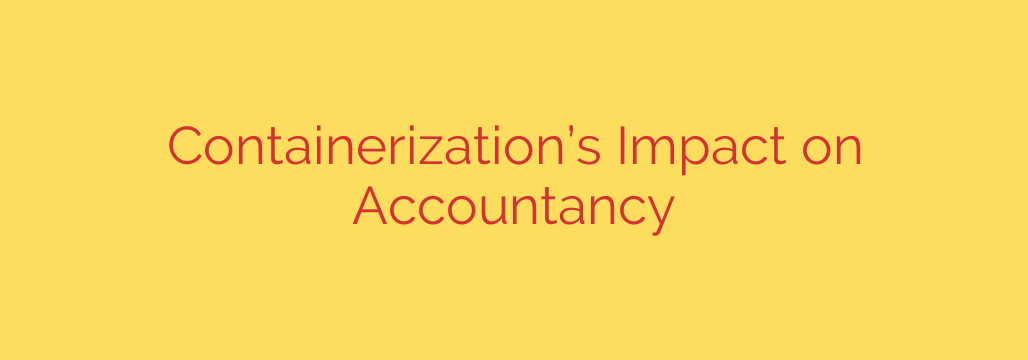
The Tech Revolution in Your Finance Department: How Containerization is Reshaping Accounting
In the world of accounting, precision, security, and efficiency are non-negotiable. While professionals focus on balance sheets and financial compliance, a powerful technological shift is happening behind the scenes that is revolutionizing the very software they rely on every day. This technology is called containerization, and it’s quietly becoming the backbone of modern, reliable, and secure financial systems.
If you’ve ever dealt with frustrating software updates, system crashes during peak reporting periods, or inconsistencies between different user environments, you’ve experienced the problems that containerization solves.
What is Containerization? A Simple Explanation
Imagine you need to ship a complex piece of machinery overseas. You wouldn’t just strap it to the deck of a ship; you’d place it inside a standardized shipping container. The container protects the machine and has everything it needs for the journey. It can be easily moved from a truck to a train to a ship without being unpacked.
Containerization does the same thing for software. A container is a lightweight, standalone package that includes an application and all of its dependencies—such as libraries, system tools, and code. The most well-known tool for this is Docker.
This simple concept has profound implications. An accounting application packaged in a container will run the exact same way on a developer’s laptop, a testing server, or the live production cloud environment. The “it worked on my machine” problem, which has plagued IT departments for decades, is eliminated.
Why Should Accountants Care About Containerization?
This isn’t just an IT trend; it directly impacts the core functions of an accounting department by enhancing performance, security, and agility.
1. Unmatched Consistency and Reliability
For accounting, data integrity is paramount. Inconsistent software behavior can lead to calculation errors, compliance issues, and corrupted data. Containerization ensures that every user is interacting with the exact same application environment. This consistency eliminates variables and dramatically increases the reliability of financial reporting and data processing. Whether you’re closing the books or running an audit, you can trust that the software is performing as designed, every single time.
2. Enhanced Security for Sensitive Financial Data
Financial systems are a prime target for cyberattacks. Containers offer a significant security advantage through isolation. Each container runs in its own isolated space, separate from other applications and the host system.
If a security vulnerability is exploited in one containerized application, the breach is typically confined to that single container. It cannot easily spread to compromise your entire accounting system or other critical business applications. This compartmentalization is a powerful defense mechanism for protecting sensitive financial information.
3. Agility and Speed in a Fast-Paced World
The business landscape changes quickly. New tax laws are passed, reporting standards are updated, and your business needs new features. In traditional IT environments, deploying updates can be a slow, risky process.
With containers, developers can build, test, and deploy updates much faster and with greater confidence. Fixing a critical bug or rolling out a new compliance feature can be done in hours or days, not weeks or months. This agility allows your finance department to adapt quickly to regulatory changes and evolving business demands.
4. Scalability for Peak Demands (Like Tax Season)
Every accounting department experiences periods of intense activity, such as year-end closing or tax season. Historically, companies had to buy and maintain powerful servers that sat idle for most of the year just to handle these peaks.
Containerized applications are incredibly scalable. Using orchestration tools like Kubernetes, your system can automatically deploy more containers to handle a heavy workload and then scale back down when the demand subsides. This means you get seamless performance during your busiest times without paying for unused capacity the rest of the year.
5. Significant Cost Savings
By running multiple containers on a single server, companies can drastically improve their hardware utilization. This means fewer physical or virtual servers are needed to run the same number of applications, leading to direct savings on hardware, energy, and maintenance costs. The efficiency and portability of containers also reduce the cost of migrating applications between on-premise data centers and cloud providers like AWS or Azure.
Actionable Security Tips for Containerized Accounting
While containers improve security, they are not a magic bullet. Proper management is crucial. If your organization is using or moving toward containerized accounting software, ensure your IT team is following these best practices:
- Scan Container Images: Only use official, vetted software images and regularly scan them for known vulnerabilities before they are deployed.
- Implement the Principle of Least Privilege: Configure containers to run with the minimum permissions necessary to function. A container for running reports should not have access to change system settings.
- Manage Secrets Securely: Never store sensitive information like passwords, API keys, or database credentials directly inside a container image. Use a dedicated secrets management tool.
- Control Network Traffic: Establish strict network policies to control which containers can communicate with each other and with external systems.
The Future of Accounting is Containerized
Containerization is more than just a technical detail; it is a fundamental shift in how reliable, secure, and efficient software is built and delivered. As accounting firms and finance departments increasingly rely on complex, data-driven applications, the stability and agility offered by containers will become standard.
By understanding the benefits of this technology, financial leaders can make more informed decisions, ask the right questions of their software vendors, and ensure their departments are equipped with the modern tools needed to succeed in an increasingly digital world.
Source: https://collabnix.com/how-containerization-is-reshaping-the-accountancy-workplace/








